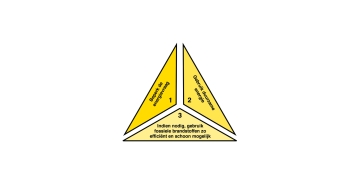Insulation: crucial in energy renovation

Energy efficient renovation requires a well thought-out approach to the entire building envelope. As far as new buildings are concerned, houses will be built to be increasingly energy efficient in the future, partly as a result of the increasingly stringent EPB regulations. For the existing housing stock, however, there is still a lot of work to be done!
Energy efficient renovation requires a well thought-out approach to the entire building envelope. As far as new buildings are concerned, houses will be built to be increasingly energy efficient in the future, partly as a result of the increasingly stringent EPB regulations. For the existing housing stock, however, there is still a lot of work to be done!
Sustainable building starts with smart insulation, states Dirk Vermeulen, Head of Technical Management at Recticel Insulation. Energy efficient renovation requires a well thought-out approach to the entire building envelope. As far as new buildings are concerned, houses will be built to be increasingly energy efficient in the future, partly as a result of the increasingly stringent EPB regulations. For the existing housing stock, however, there is still a lot of work to be done!
Belgian households, the second largest energy wasters in Europe
Belgian households, with average 1.42 tons of CO2 emissions per capita, are the second largest energy wasters in Europe, an emission almost twice as high as the European average. Most of these CO2 emissions are due to energy consumption for space heating. And here the characteristics of the Belgian housing stock play a major role.
Belgium, like Europe, has an old housing stock. No less than 38.3% of all housing in Belgium was built before 1946. In addition, the average surface area of Belgian residential buildings is the third largest in Europe at 124.3 m², and we traditionally have a high proportion of detached houses. These three factors together are the cause of our increased energy consumption for space heating in Belgium and even result in the second largest energy consumption in Europe.
Need for a new wave of renovation in Belgium
To meet the 2050 energy targets, the renovation market is crucial. Today, people mainly renovate to modernize their homes (a new bathroom, an open kitchen) and energy savings tend to take second place as a renovation driver. However, you can save a lot in the long run with an energy renovation.
Roof, wall and floor insulation are the interventions par excellence to drastically reduce the energy consumption in a house in a sustainable way.
The Trias Energetica principle is important here, a three-step strategy to achieve an energy-efficient design:
- Reduce energy demand by eliminating waste,
- Make maximum use of energy from sustainable sources (sun, wind, soil, water),
- Use fossil fuels as efficiently as possible for the remaining energy demand (e.g. by means of a heat pump or a condensing boiler).
It is high time for a new wave of renovation in Belgium, because the challenges in renovation are not insignificant.
20% of Belgian homes today have no roof insulation at all. In addition, we should not lose sight of the fact that in the remaining 80% of roofs, a large part will be insufficiently insulated. Walls and floors could also use some extra insulation. After all, the figures tell us that the potential is even greater this way.
When renovating, a thorough analysis of the existing situation is absolutely necessary. Drawing up a renovation strategy is also a must in order to bring the project to a successful conclusion. Renovation can be done in different phases. A logical sequence of works is best respected to avoid failure costs or problems. A classic example is the facade, which is only insulated a few years after the roofing works. Often, the gutters must then be adapted again because of the extra thickness of the facade. This thickness compensation can best be included in the roofing works from the start.
Read this new report that shows where our challenges lie in the direction of Green Deal 2050 and how we can all strive for a near-zero energy home.
Latest insights & stories

AI and data integration: an indispensable symbiosis

Seven cybersecurity trends and threats for 2025
Last year saw another alarming increase in cyber-attacks, with hackers using increasingly sophisticated methods. Proximus NXT and its security partners explain how to navigate a minefield of vulnerabilities in 2025.
IT is innovating faster than ever. We should embrace the limitless possibilities in cloud adoption, generative and non-generative artificial intelligence and the increasing use of APIs, says our expert panel. At the same time, cyber criminals see such trends as opportunities to compromise businesses and are capitalizing on new vulnerabilities.

The az groeninge hospital innovates care with 5G
A private 5G network at az groeninge provides the platform for the hospital to roll out innovation. From remote monitoring with biosensors to robotic surgery and training using VR: everything is focused on patient care.